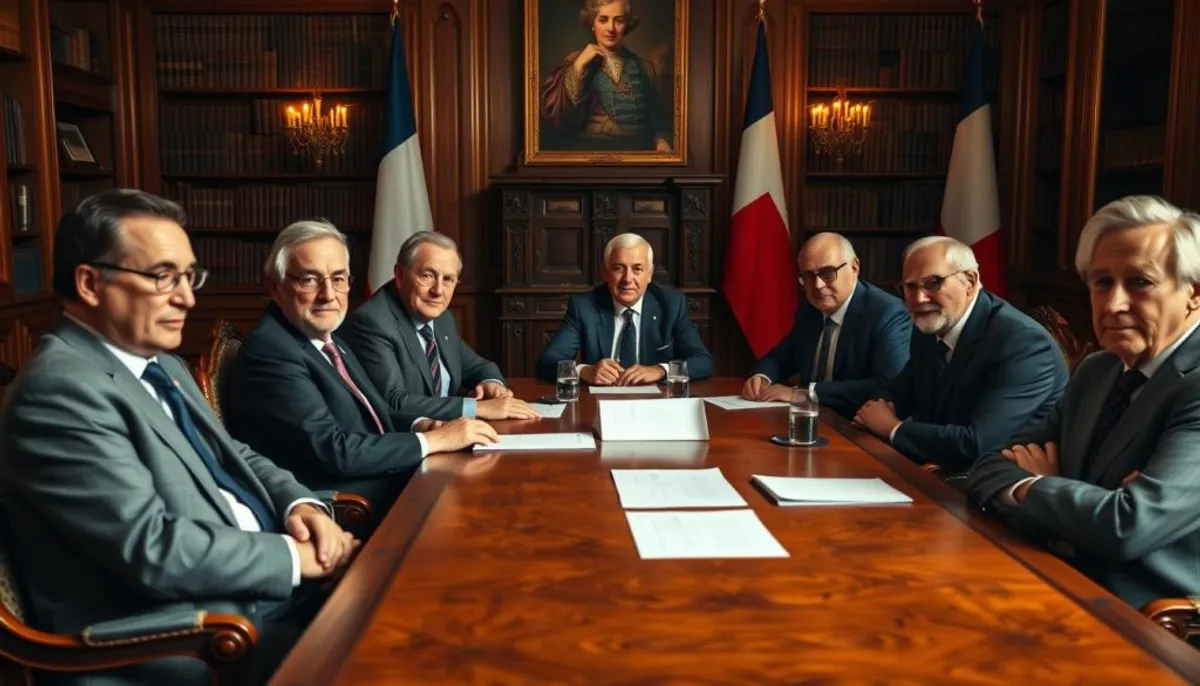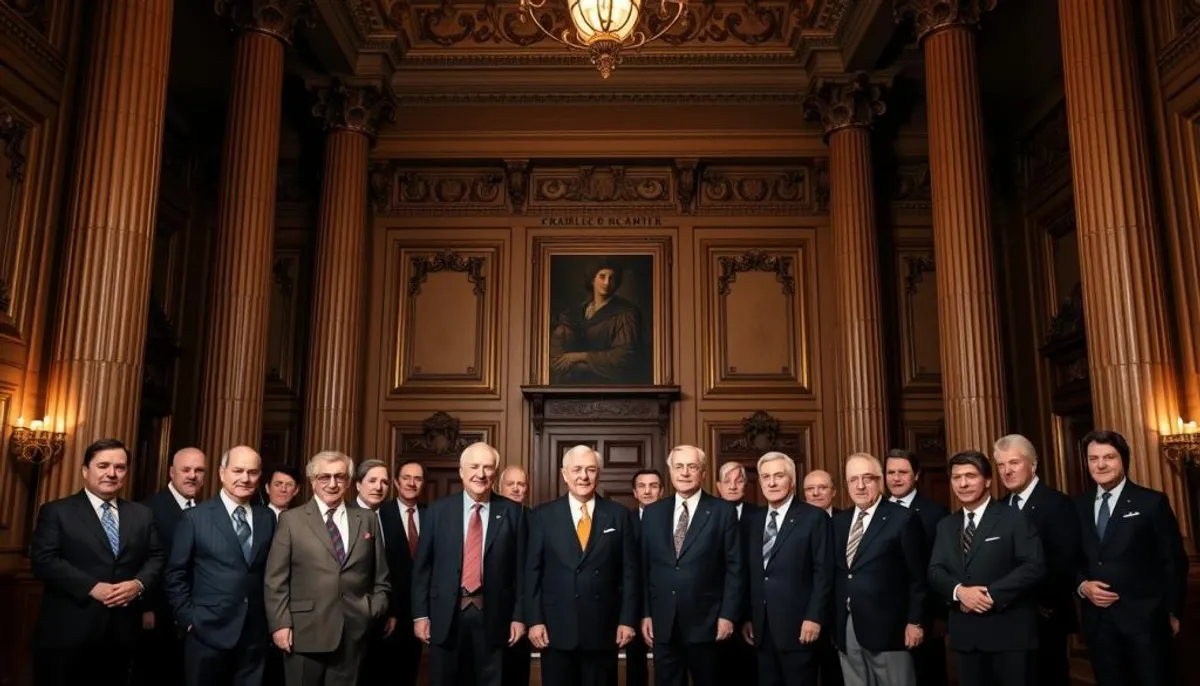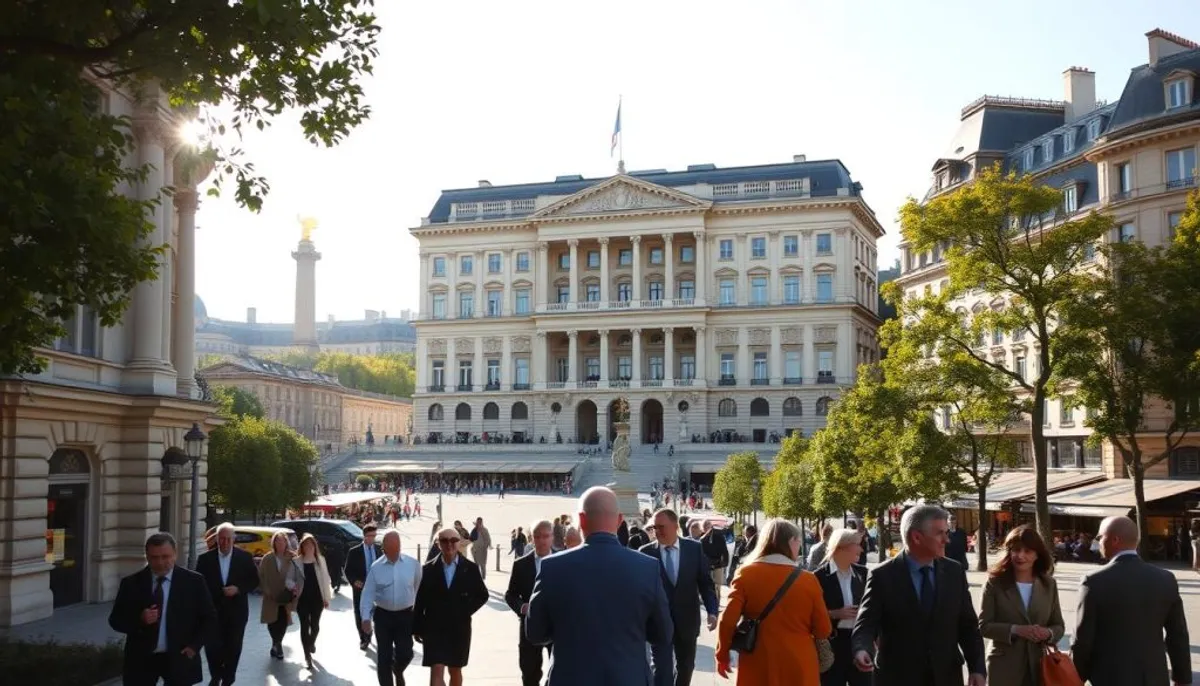The French Ministry of Culture, established on January 8, 1959, has had more than twenty-seven ministers. Each has brought their vision, shaping the country's cultural policy. Their influence is profound and unique.
André Malraux, a symbol, held this position from 1959 to 1967. He defined the foundations of the French cultural institution.

The responsibilities of the ministry have evolved over time. From 1997 to 2017, it merged with Communication. This expanded its role.
Jack Lang, with his long mandate, marked the 1980s and 1990s. Catherine Trautmann, Frédéric Mitterrand, and Renaud Donnedieu de Vabres also influenced cultural policy.
Rachida Dati, in office since January 11, 2024, succeeds Rima Abdul Malak and Roselyne Bachelot. She faces many challenges. The ministry has a budget of 4.135 billion euros and a team of over 10,000 employees.
The creation of the Ministry of Culture in France
The birth of the Ministry of Culture in France represents a major turning point in the country's cultural policy. This institution, created to promote French cultural heritage and contemporary art, has profoundly shaped the artistic and cultural landscape of the nation.
The transition from the Directorate of Arts and Letters to the ministry
Before the creation of the ministry, cultural management fell under the Directorate of Arts and Letters, attached to the Ministry of National Education. This structure evolved over time:
- 1860-1863: Alexandre Colonna Walewski becomes Minister of State in charge of Fine Arts
- 1870: Creation of the Ministry of Fine Arts
- 1881-1882: Antonin Proust appointed Secretary of State for Fine Arts with ministerial rank
- 1947: Pierre Bourdan becomes Minister of Youth, Arts, and Letters
The founding role of André Malraux
In 1959, André Malraux became the first Minister of Culture of the Fifth Republic. His role is crucial in defining the missions of the new ministry. He emphasizes the democratization of culture and the preservation of French cultural heritage.
The initial organization of the ministry
The Ministry of Culture, tailored for Malraux, is organized around several axes:
| Domain | Actions |
|---|---|
| Heritage | Preservation of historical monuments, development of archaeology |
| Artistic creation | Support for theater and dance companies |
| Cultural dissemination | Creation of regional contemporary art funds, development of libraries |
| Artistic education | Implementation of programs like "college at the cinema" |
This initial organization laid the groundwork for an ambitious cultural policy aimed at making culture accessible to all French people.
Who are the former ministers of culture
Since 1959, the Ministry of Cultural Affairs has been led by prominent figures. André Malraux, an iconic name, headed this department for ten years. He laid the foundations of French cultural policy.
Jack Lang, with his mandate from 1981 to 1993, left an indelible mark on the French cultural landscape. Renaud Donnedieu de Vabres, minister from 2004 to 2007, worked on adapting the ministry to the challenges of the digital age.
| Minister | Period | Length of term |
|---|---|---|
| Jacques Toubon | 1993 – 1995 | 2 years |
| Renaud Donnedieu de Vabres | 2004 – 2007 | 3 years |
| Fleur Pellerin | 2014 – 2016 | 1 year and 6 months |
| Roselyne Bachelot | 2020 – 2022 | 1 year and 10 months |
| Rima Abdul Malak | 2022 – 2024 | 1 year and 8 months |
28 ministers have marked the history of the Ministry of Cultural Affairs. Each has brought their vision and priorities. The terms have varied in length, some having a major impact, others more limited. Changes in the ministry's responsibilities reflect societal and technological evolution, with a final update in January 2025.

The former ministers of culture have shaped French cultural policy. They adapted their actions to the issues of their time, from cultural democratization to the digital age.
The great historical figures of the ministry
The French Ministry of Culture has been marked by exceptional French cultural personalities. Two ministers have particularly influenced cultural policy in France: André Malraux and Jack Lang.
André Malraux: the founding minister (1959-1969)
André Malraux laid the foundations of French cultural policy. He created the Maisons de la Culture, aiming to make art accessible to all. His actions profoundly marked the French cultural landscape.
Jack Lang: the architect of cultural democratization (1981-1993)
Jack Lang revolutionized the approach to culture in France. He initiated the Fête de la Musique and significantly increased the ministry's budget. His cultural democratization policy brought art closer to the general public.
The major contributions of emblematic ministers
These ministers have durably shaped the French cultural landscape, including Lille culture. Their vision has influenced subsequent cultural policies, making France a country recognized for its commitment to culture.
| Minister | Period | Major contributions |
|---|---|---|
| André Malraux | 1959-1969 | Creation of the Maisons de la Culture |
| Jack Lang | 1981-1993 | Fête de la Musique, increase in cultural budget |
The women ministers of Culture
The female presence within the Ministry of Culture in France has undergone a profound transformation. This evolution reflects the societal and political changes in the country. Today, women play a crucial role in managing French cultural affairs.
From Françoise Giroud to Rachida Dati
Françoise Giroud made history by becoming the first female Secretary of State for Culture in 1974. Since then, several exceptional women have led this ministry. Françoise Nyssen, a renowned publisher, brought her unique vision. Aurélie Filippetti, on the other hand, emphasized cultural democratization. More recently, Roselyne Bachelot navigated through the challenges of the health crisis.
The impact on cultural policy
Women ministers have shaped French cultural policy. They introduced reforms to make culture more accessible and inclusive. For example, Françoise Nyssen created the Culture pass for young people. Aurélie Filippetti strengthened artistic education in schools.
Major reforms initiated
Female ministers have led large-scale reforms. Roselyne Bachelot implemented support for artists during the pandemic. Rachida Dati, the 11th woman to head the ministry, continues this tradition of innovation. These women have brought new perspectives, enriching the French cultural landscape.
The evolution of ministerial attributions
The French Ministry of Culture has undergone profound transformations since its foundation in 1959. The roles of culture ministers have evolved, reflecting changes in cultural policy in France and Congolese traditions.
In 1958, the Ministry of Culture was born, followed by the Ministry of Environment in 1971. These two ministries have resisted the ephemeral, such as "leisure time" or "solidarity economy." Their evolution reflects adaptation to societal challenges.
Since 2021, program 224 "Support for the cultural policies of the Ministry of Culture" focuses on international cultural action. This evolution highlights the growing importance of French cultural influence internationally.
| Year | Evolution of attributions |
|---|---|
| 1959 | Creation of the Ministry of Culture |
| 2021 | Refocusing on international cultural action |
| 2022 | Development of international action |
In 2022, the ministry continues its international development. It implements the presidential plan for the French language. It supports 37 priority countries in exporting cultural industries. These changes illustrate the constant adaptation of French cultural policy to current challenges.
Significant cultural policies since 1959
The creation of the Ministry of Culture in 1959 marked a turning point in French cultural policy. This period, known as the "Glorious Thirty," was marked by exponential growth in cultural production. It also saw a significant increase in public engagement.
The democratization of culture
The democratization of culture has been a pillar of French cultural policy. During the 1950s-1970s, cultural activities increased by 13% thanks to government efforts. The Maisons de la Culture played a key role in making art accessible to all. Additionally, the impact of television was decisive, with a 50% increase in public engagement in cultural programs.

Support for artistic creation
Support for artistic creation intensified, with a particular focus on avant-garde movements. Between 1950 and 1960, 36 major exhibitions highlighted modern art. The music scene also flourished, with 535 songs published by influential artists like Boris Vian. These works reflect the emerging youth culture of the time.
The preservation of heritage
The preservation of French cultural heritage became a priority. The budget allocated to culture reached 1.3% of the national budget in the 1960s, showing the government's commitment. Events like the 1958 World Expo in Brussels attracted 3.5 million international visitors. These initiatives contributed to strengthening France's cultural influence abroad.
The contemporary challenges of the Ministry of Culture
The Ministry of Culture, led by Rachida Dati since January 2024, faces crucial challenges. It is about preserving and promoting French cultural heritage. Cultural policy in France is evolving to adapt to the realities of the 21st century.
Adaptation to the digital age
Digitalization is revolutionizing the cultural landscape. The ministry invests in digitizing heritage and supports digital creation. The National Music Center will benefit from funding through a tax on streaming platforms starting in 2024. This aims to adapt support for the music industry to the digital age.
The protection of cultural heritage
The safeguarding of French cultural heritage remains a priority. The 2024 budget allocates 4.45 billion euros to the ministry, a record. However, challenges remain, including environmental threats and the illicit trafficking of cultural goods.
International cultural influence
Despite the challenges, France maintains its global cultural influence. The artistic creation sector benefits from 1.041 billion euros, including 550 million for the regions. This distribution aims to strengthen the diversity and dynamism of French culture at both national and international levels.
| Aspect | 2024 Budget | Objective |
|---|---|---|
| Total ministry budget | 4.45 billion € | Overall support for culture |
| Artistic creation | 1.041 billion € | Promotion of cultural diversity |
| Support for regions | 550 million € | Cultural decentralization |
| Festivals | 32 million € | National cultural influence |
In the face of these challenges, the Ministry of Culture is adapting its strategy. It aims to preserve cultural heritage while stimulating contemporary creation. Thus, it ensures the sustainability and dynamism of cultural policy in France.
Conclusion
Since its foundation in 1959, the Ministry of Culture has been essential for the promotion and preservation of French cultural heritage. The ministers, from André Malraux to Rachida Dati, have guided cultural policy with dedication and ambition. Their work has been marked by a desire to promote French culture worldwide.
Facing various challenges, these figures have been pioneers. They have worked to democratize culture and adapt it to technological advancements. Women ministers, such as Françoise Giroud and Fleur Pellerin, have introduced innovative perspectives and initiated significant reforms. Their influence has been profound, shaping the cultural direction of the country.
The Ministry of Culture is now confronted with major challenges. A recent hearing of five former ministers revealed tensions surrounding the future of public broadcasting. Despite disagreements, the commitment to French culture remains strong. This underscores the importance of the ministry's role in preserving French cultural identity.
RelatedRelated articles


